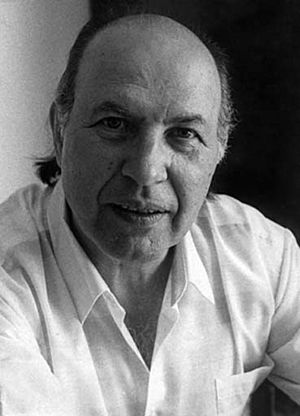Imre Kertész facts for kids
Quick facts for kids
Imre Kertész
|
|
|---|---|
 |
|
| Born | 9 November 1929 Budapest, Hungary |
| Died | 31 March 2016 (aged 86) Budapest, Hungary |
| Occupation | Novelist |
| Nationality | hungarian |
| Notable works | Fatelessness Kaddish for an Unborn Child Liquidation |
| Notable awards | Nobel Prize in Literature 2002 |
| Spouse | Albina Vas (d. 1995) Magda Ambrus
(m. 1996) |
Imre Kertész (born November 9, 1929 – died March 31, 2016) was a Hungarian author. He received the 2002 Nobel Prize in Literature. The Nobel committee honored him for his writing that shows "the fragile experience of the individual against the barbaric arbitrariness of history." He was the first Hungarian writer to win this prestigious award. His books often explore themes like the the Holocaust, living under a dictatorship, and personal freedom. Kertész survived German concentration camps during World War II.
Contents
Life and Writing Journey
Early Life and World War II
Imre Kertész was born in Budapest, Hungary, on November 9, 1929. His parents were Aranka Jakab and László Kertész, a Jewish couple. When he was about five years old, his parents separated. Imre then attended a boarding school. In 1940, he started high school. He was placed in a special class for Jewish students.
During World War II, in 1944, Kertész was sent away. He was only 14 years old. He was deported with other Hungarian Jews to the Auschwitz concentration camp. Later, he was moved to Buchenwald. When he arrived at Auschwitz, Kertész said he was 16 and a worker. This saved him from being immediately killed, which often happened to younger people.
After the War and Early Career
After his camp was freed in 1945, Kertész went back to Budapest. He finished high school in 1948. Then, he began working as a journalist and translator. In 1951, he lost his job at a newspaper called Világosság (Clarity). This happened because the newspaper started to support Communism.
For a short time, he worked in a factory. Later, he worked for the Ministry of Heavy Industry. From 1953, he became a freelance journalist. He translated many important works into Hungarian. These included writings by famous thinkers like Friedrich Nietzsche and Sigmund Freud.
His Most Famous Work: Fatelessness
Kertész's most well-known book is Fatelessness (Sorstalanság). It tells the story of a 15-year-old boy named György (George) Köves. The book describes his experiences in the concentration camps of Auschwitz, Buchenwald, and Zeitz. Kertész wrote this novel between 1969 and 1973.
At first, the Communist government in Hungary would not publish it. But it was finally released in 1975. Some people think the book is like Kertész's own story. However, he said it was not exactly about his life. Today, Fatelessness is part of the school curriculum in Hungary. In 2005, a movie based on the novel was made. Kertész even wrote the script for the film.
Other Important Books
After Fatelessness, Kertész wrote Fiasco (1988) and Kaddish for an Unborn Child (1990). These two books are the second and third parts of his series about the Holocaust. His other works translated into English include Kaddish for an Unborn Child and Liquidation. Liquidation is set during the time when Hungary was changing from Communist rule to a democracy.
Moving to Germany
At first, Kertész's writing was not very popular in Hungary. So, he moved to Germany. There, he found more support from publishers and readers. Even after moving, he kept translating German books into Hungarian. He translated works by writers like Friedrich Dürrenmatt and Ludwig Wittgenstein. Kertész continued to write his own stories in Hungarian. He did not publish another novel until the late 1980s. After that, he sent his work to publishers in Hungary. Kertész was very thankful for his success in Germany. He left some of his belongings to the Academy of Arts, Berlin in Berlin.
Later Years and Passing
In November 2013, Kertész had hip surgery after a fall. He faced various health issues in his later years. He was diagnosed with Parkinson's disease. Imre Kertész passed away on March 31, 2016, at his home in Budapest. He was 86 years old.
List of Works
- Sorstalanság (1975)
- A nyomkereső (1977)
- Detektívtörténet (1977)
- A kudarc (1988)
- Kaddis a meg nem született gyermekért (1990)
- Az angol lobogó (1991)
- Gályanapló (1992)
- A holocaust mint kultúra: Három előadás (1993)
- Jegyzőkönyv (1993)
- Valaki más: A változás krónikája (1997)
- A gondolatnyi csend, amíg a kivégzőosztag újratölt (1998)
- A száműzött nyelv (2001)
- Felszámolás (2003)
- K. dosszié (2006)
- Európa nyomasztó öröksége (2008)
- Mentés másként (2011)
- A végső kocsma (2014)
Awards and Honors
International Prizes
- 1992, 1995: Soros Prize
- 1995: Brandenburg Literature Prize
- 1997: Friedrich-Gundolf-Preis
- 1997: Jeanette Schocken Preis
- 2000: Herder Prize
- 2000: Welt-Literaturpreis
- 2001: Pour le Mérite (Germany)
- 2002: Hans Sahl Prize
- 2002: Nobel Prize in Literature
- 2003: YIVO Lifetime Achievement Award
- 2004: Corine Literature Prize
- 2004: Goethe Medal
- 2009: Jean Améry Prize
- 2011: Grande Médaille de Vermeil de la ville de Paris
Hungarian Prizes
- 1983: Milán Füst Prize
- 1986: Hieronymus Prize
- 1988: Artisjus Literature Prize
- 1989: Aszu Prize
- 1989: Attila József Prize
- 1997: Kossuth Prize
- 2002: Honorary Citizen of Budapest
- 2014: Hungarian Order of Saint Stephen
See also
 In Spanish: Imre Kertész para niños
In Spanish: Imre Kertész para niños
- Hungarian literature
- List of Jewish Nobel laureates
 | Emma Amos |
 | Edward Mitchell Bannister |
 | Larry D. Alexander |
 | Ernie Barnes |

